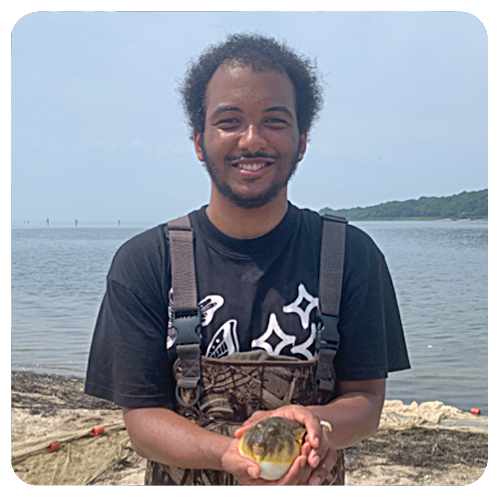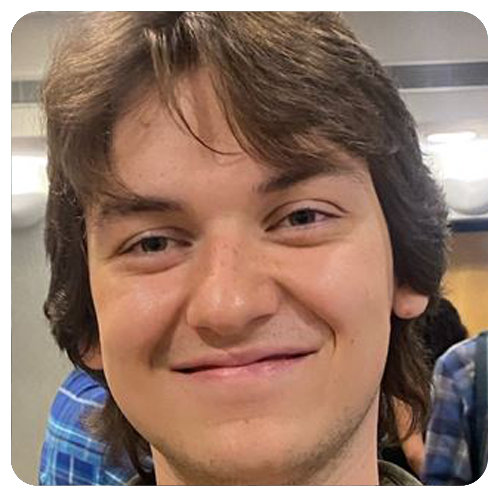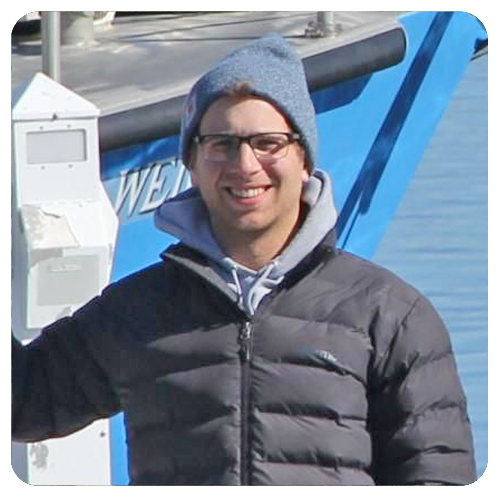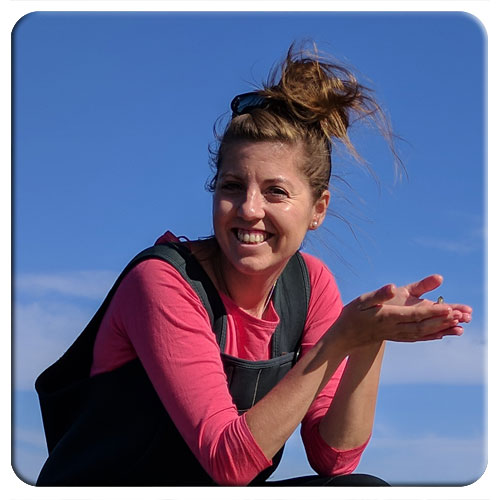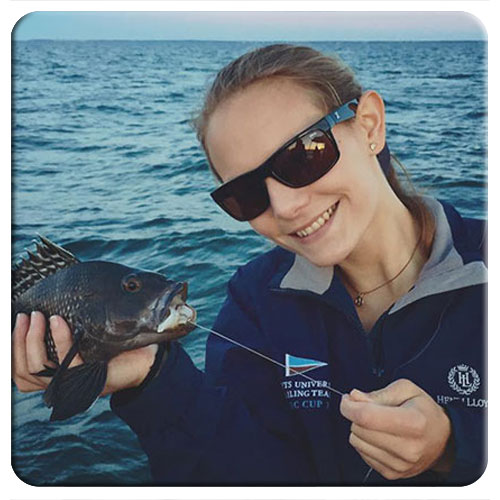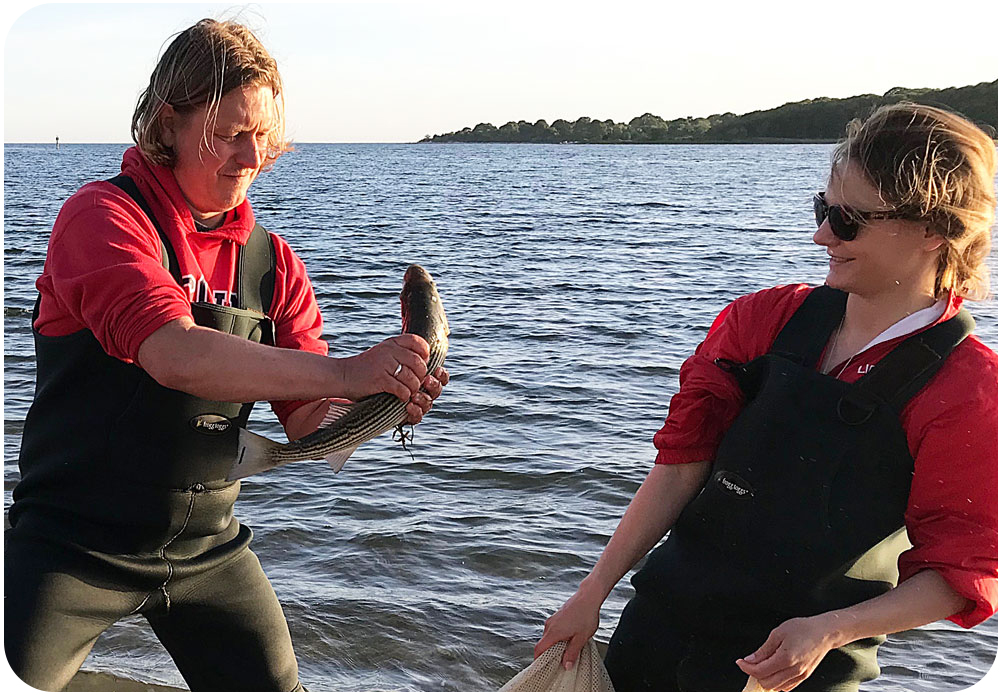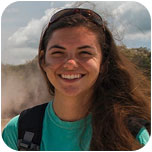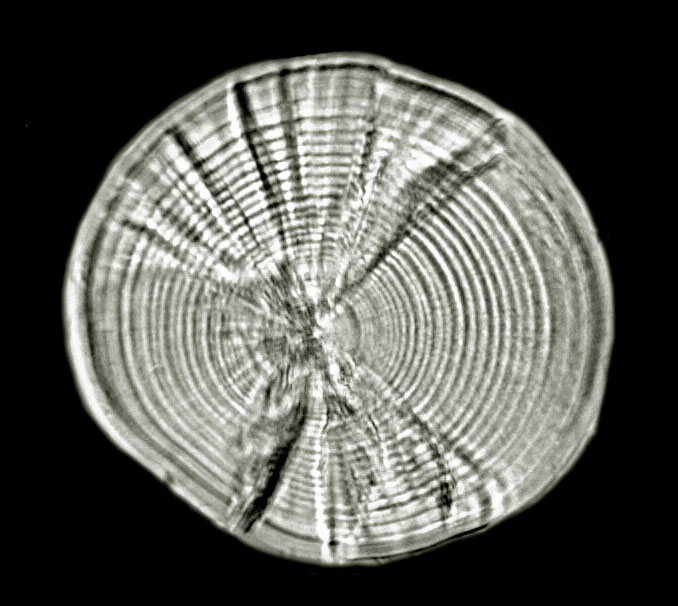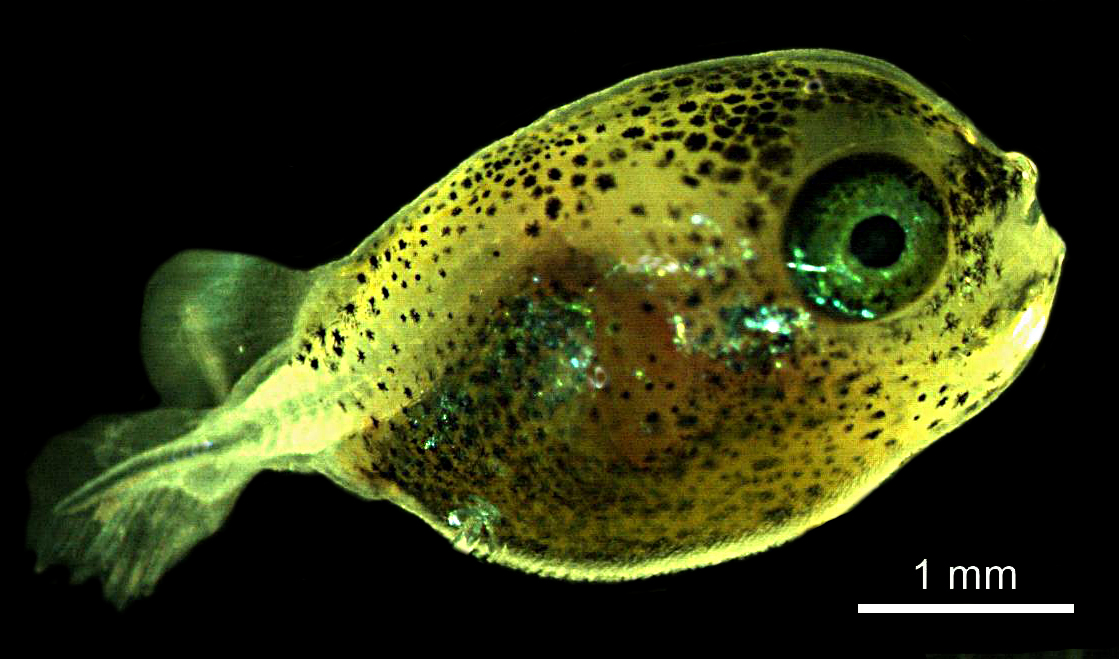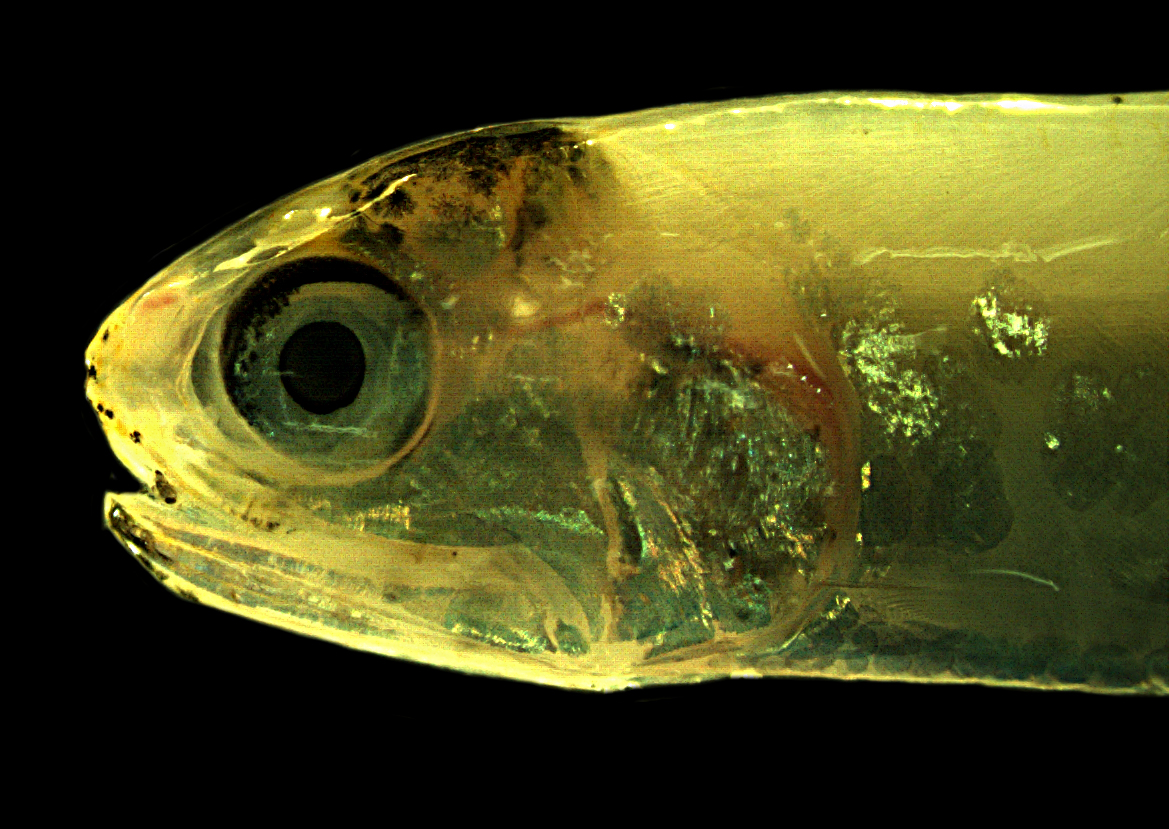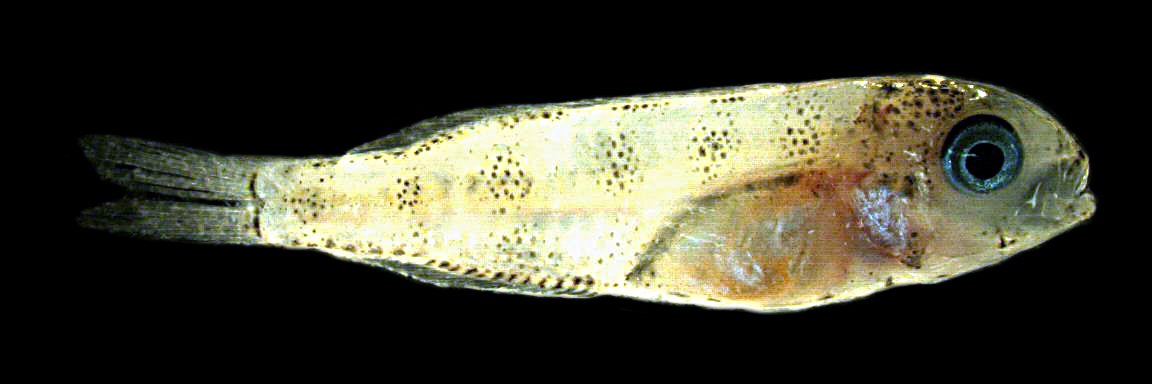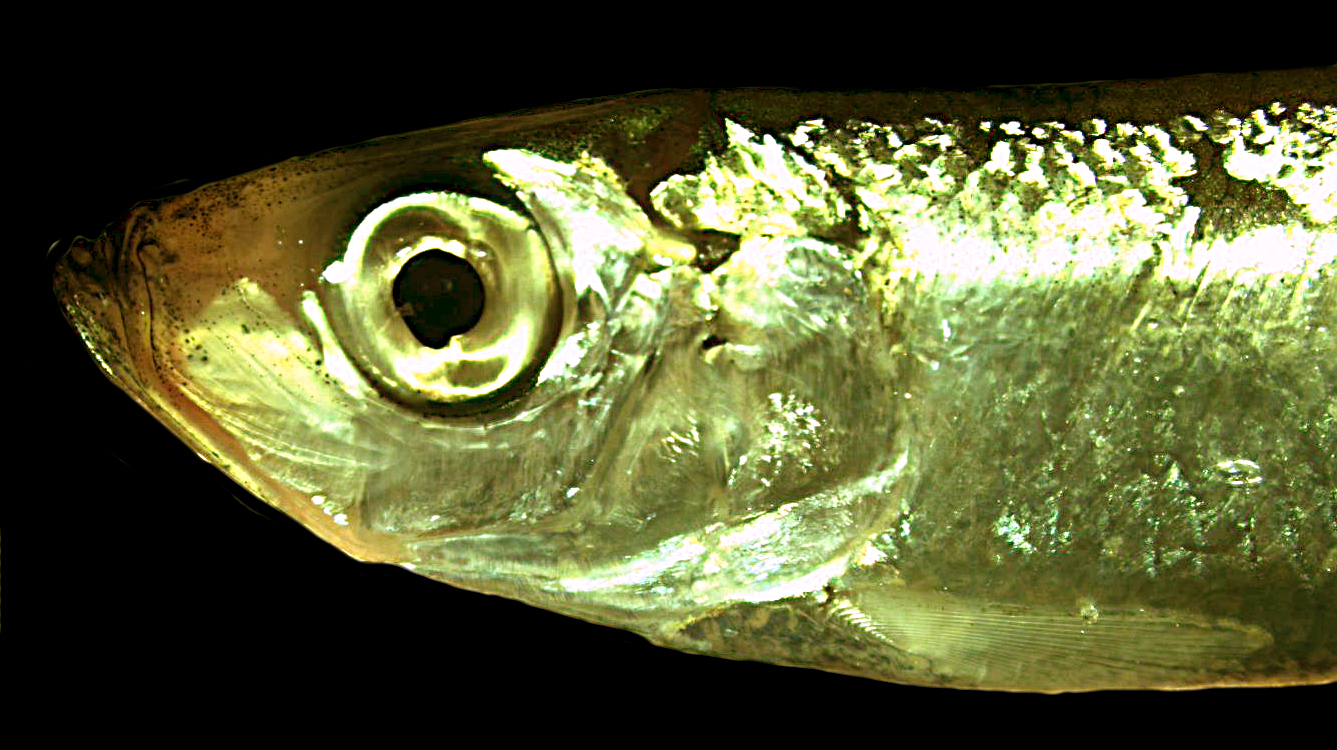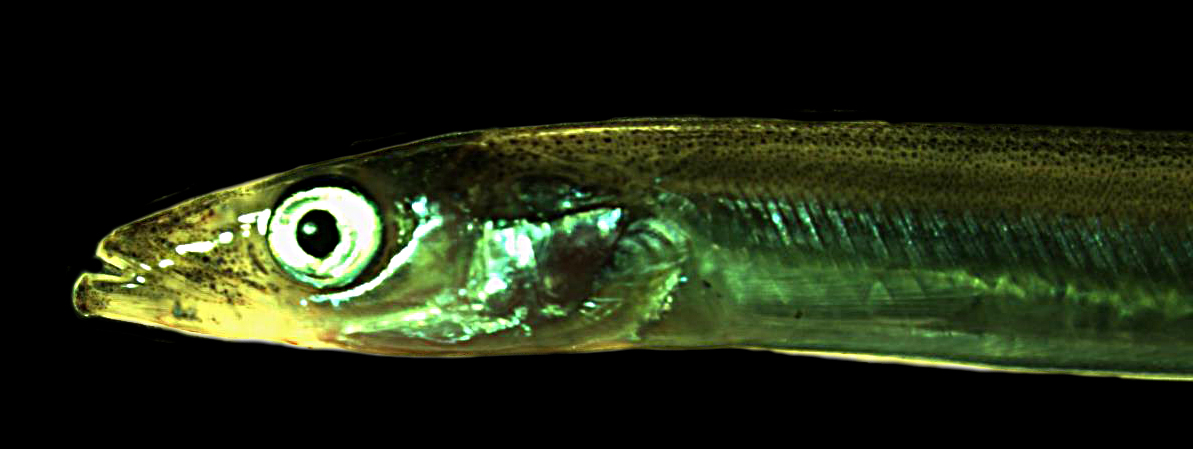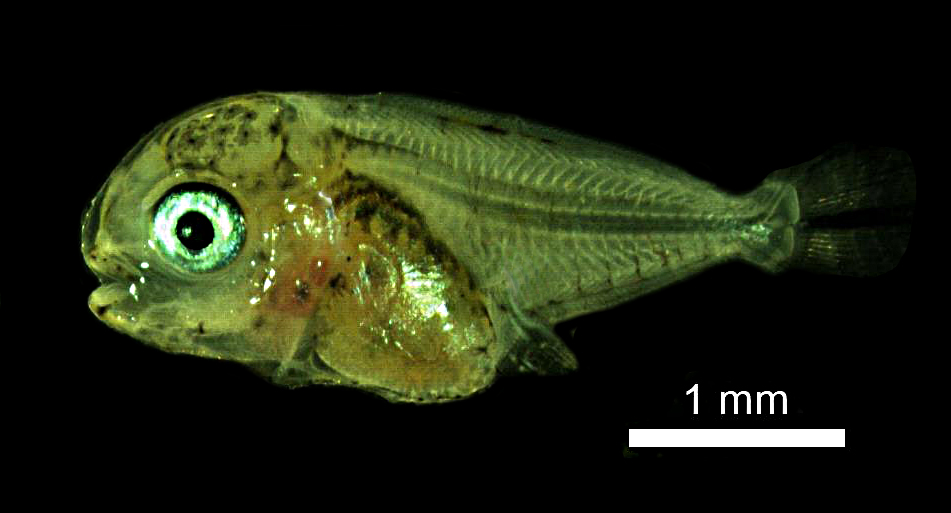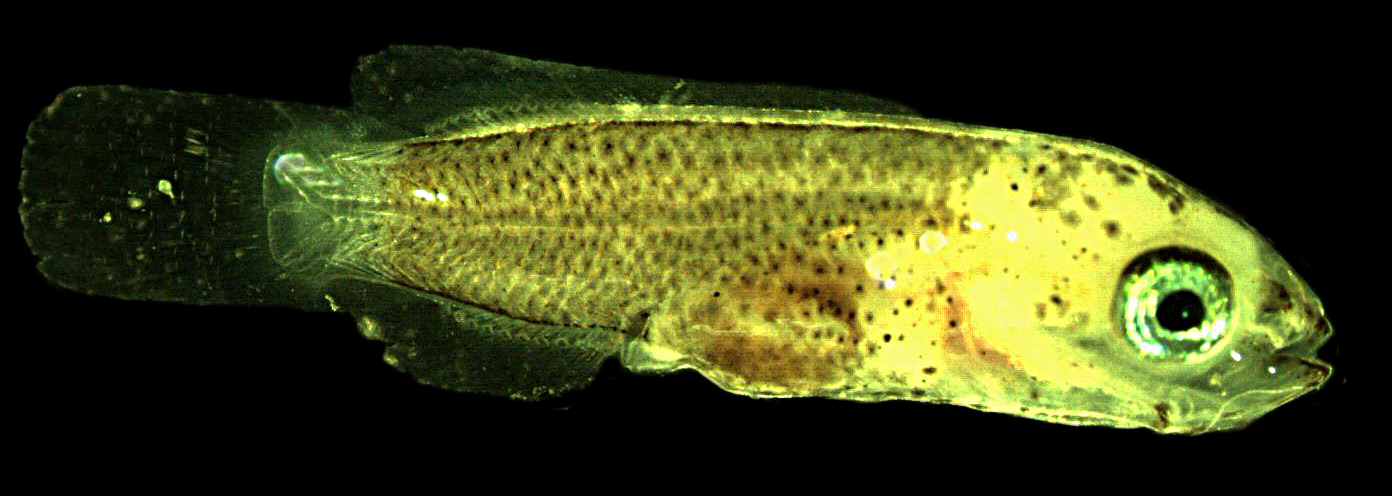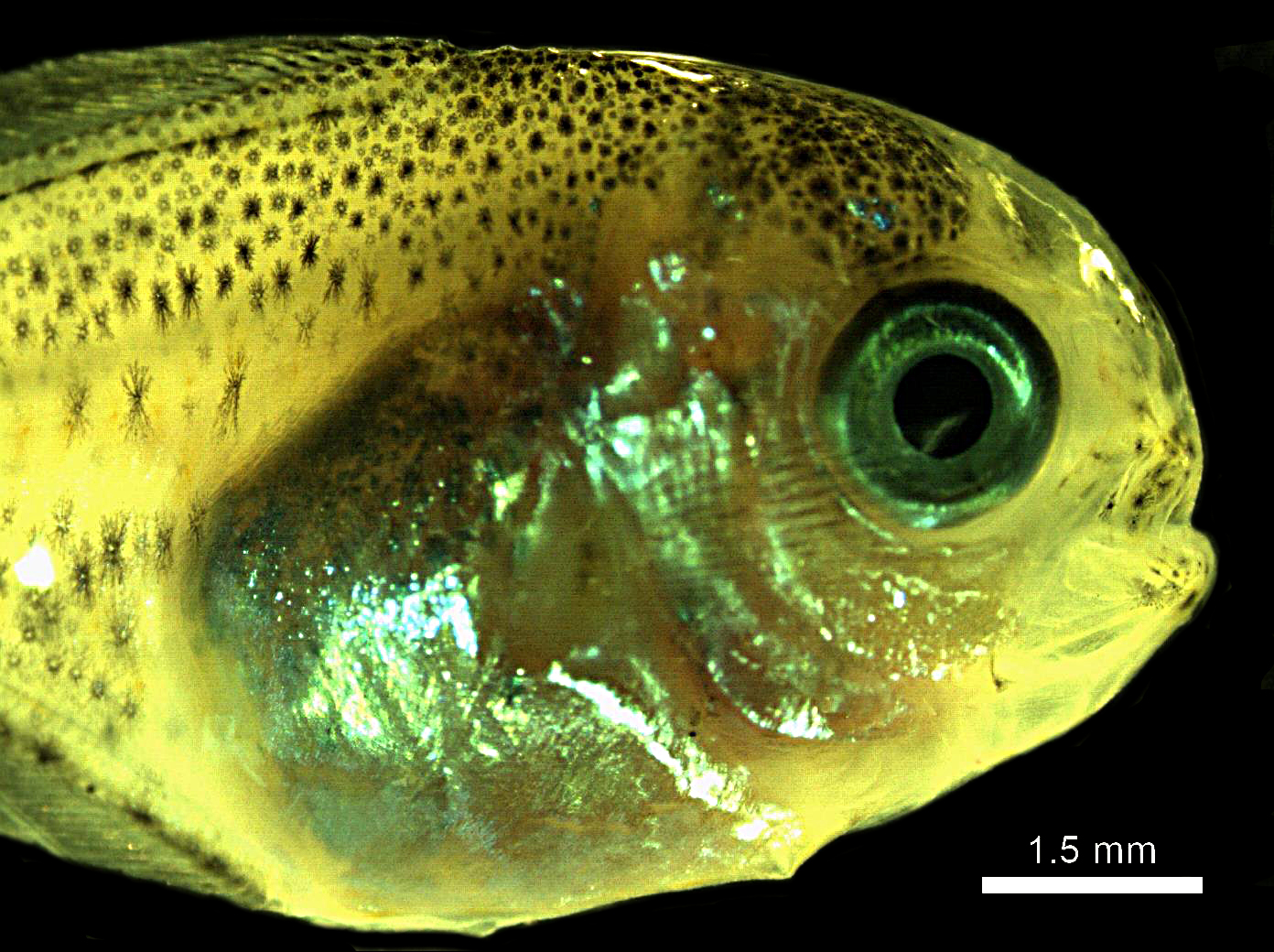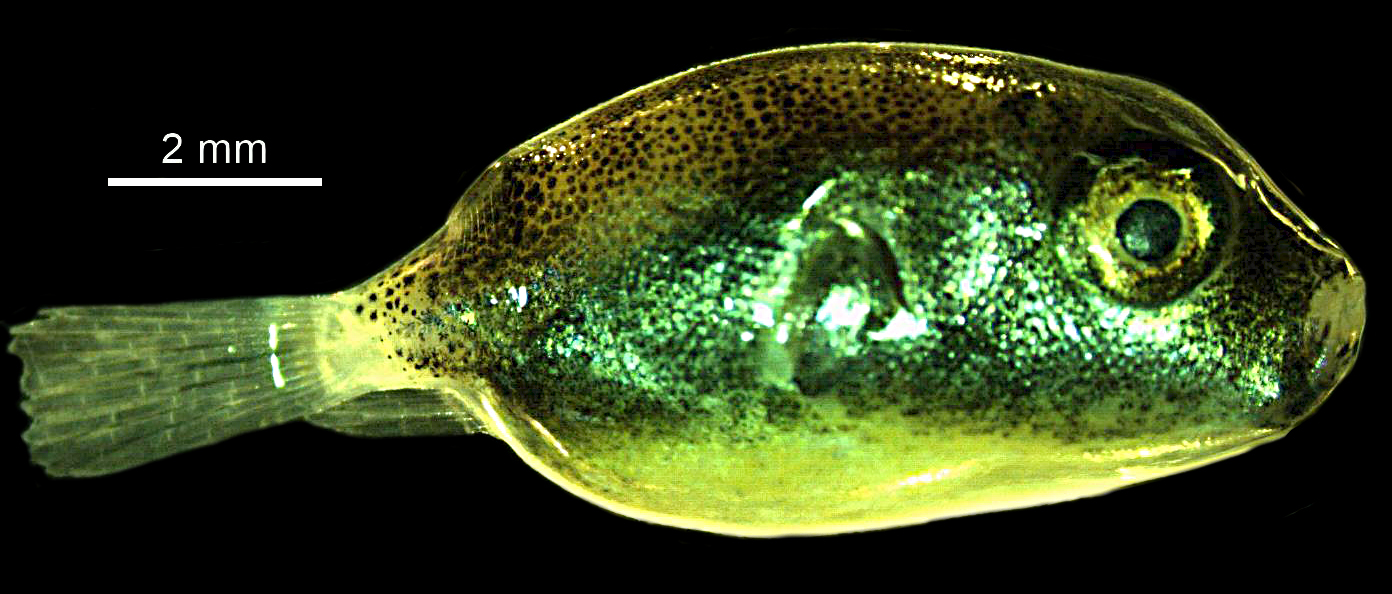
Nicholas Beckles / Steven Pancurak (NSF-REU students, 2024)
During their 10 weeks of intense immersion into Marine Sciences they worked as a team on two projects: First, they conducted weekly beach seine surveys in Mumford Cove to quantify the seasonal change in fish species diversity there, while pioneering a method to photograph specimens live and return them into the water to avoid sampling mortality.
Second, they worked together with Dr. Zofia Baumann on measuring mercury concentrations in over 650 samples of white muscle tissue in Black Sea Bass in order to assess health-risk to human consumers of this fish species and to better understand mercury as a tracer of consumption in fishes in general.
During their time, Nicholas and Steven presented both a poster and a talk about their work and will likely continue to be involved in the processing and eventual publication of their work. During their time, they also enjoyed the help and mentorship of the labs graduate students Emma Siegfried and Hannah Roby.
Thank you, Nick and Steven for your enthusiasm, diligence, and productivity! All the best on your future paths!
- Beckles, N., Pancurak, S., and Baumann, H. What's in the Cove? A study of juvenile fish diversity in Mumford Cove. NSF-REU 2024 oral symposium, Avery Point, 7 August 2024
- Pancurak, S., Beckles, N., Baumann, H., and Baumann, Z. Physical characteristics and mercury concentration in Black Sea Bass. NSF-REU 2024 oral symposium, Avery Point, 7 August 2024
Max Zavell (PhD student, 2020-2024)
On 18 April 2024, after only three and a half years, Max defended his PhD thesis titled "Experimental assessment of ocean warming and acidification effects on multiple life stages of Black Sea Bass, Centropristis striata". A big, heartfelt congratulations from the entire lab!Max already published the first two chapters of his PhD thesis:
- Zavell, M.D., Mouland, M.E.P., Matassa, C.M., Schultz, E.T., and Baumann, H. (2024) Temperature- and ration-dependent winter growth in Northern stock Black Sea Bass juveniles. Transactions of the American Fisheries Society 153: 163-179
- Zavell, M.D.* and Baumann, H. (2024) Resiliency of Black Sea Bass, Centropristis striata, early life stages to future high CO2 conditions
Environmental Biology of Fishes 107:677–691
while a third one is in submission:
- Zavell, M.D, Mouland, E.P., Barnum, D.L., Matassa, C.M., Schultz, E.T., and Baumann, H. An experimental assessment of Northern Stock Black Sea Bass overwintering potential in Long Island Sound, USA. Marine and Coastal Fisheries
In addition, Max published another article outside of his PhD research
- Zavell, M.D., Lindahl, O., Filgueira, R., and Shumway, S.E. (2023). An Estimate of Carbon Storage Capabilities from Wild and Cultured Shellfish in the Northwest Atlantic and Their Potential Inclusion in a Carbon Economy. Journal of Shellfish Research 42:325-342
Max is now beginning a new chapter of life and science at the University of Massachusetts Dartmouth, where he will oversee the large and growing research program on offshore wind energy. Max can be reached at mzavell@umassd.edu
Kelli Mosca (MS student, 2020-2022)
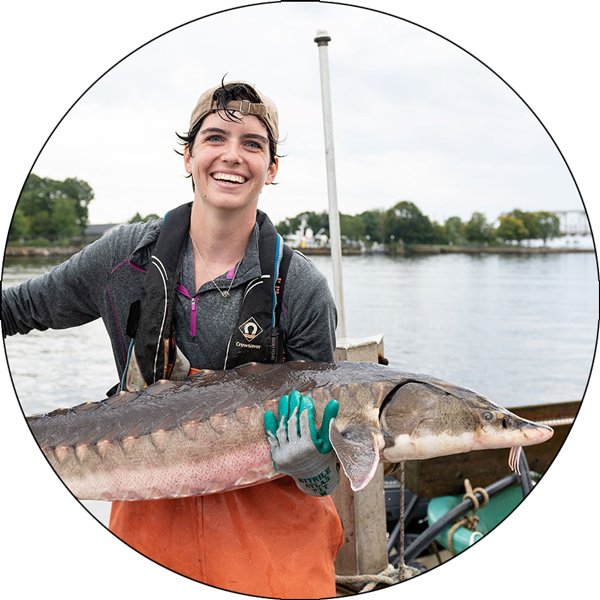
Kelli Mosca received a Bachelors degree from the University of New Haven in spring 2017 and started in January 2020 as a graduate student in the Fish Ecology Lab. She had already become a dedicated seasonal worker at the Connecticut Department of Energy and Environmental Protection (CTDEEP), where she assisted particularly with the sturgeon monitoring program. This has made her the perfect candidate to work on our CT SeaGrant project to look at age and telemetry data of Atlantic Sturgeon in Long Island Sound and the Connecticut River. Kelli worked hard and independently, mastering not only the technical aspects of the project but also the challenges imposed by the COVID pandemic that sadly marked her entire time as a graduate student. Undeterred, Kelli graduated with her Masters on 21 March 2022, presenting her thesis titled"Atlantic sturgeon (Acipenser oxyrinchus) Growth and Habitat Use in the Connecticut River and Long Island Sound" (Link to recording).
Kelli was an inspirational and cherished member of the Baumann lab, and her dedication and continued work for CTDEEP were rewarded by an offer for a CTDEEP Fishery Biologist I position, which she has wholeheartedly accepted. Congratulations Kelli, and all the best for the next steps in your career!You can read more about Kelli from this UConn Today Alumni profile (7 May 2022)
- Mosca, K.C. Atlantic sturgeon (Acipenser oxyrinchus) Growth and Habitat Use in the Connecticut River and Long Island Sound. University of Connecticut 2022, MS Thesis.
Kelli's thesis research was recently published in the traditional NOAA journal Fishery Bulletin
- Mosca, K.C., Savoy, T., R. Benway, J., Ingram, E.C., Schultz, E.T., and Baumann, H. (2025) Age structure and seasonal movement patterns of Atlantic sturgeon aggregating in eastern Long Island Sound and the Connecticut River Fishery Bulletin 123:127-142
You can reach Kelli now at kelli.mosca@ct.gov
Callie Concannon (MS student, 2018-2020)

Callie Concannon started in our lab in fall 2018 after getting her Bachelors from the University of Massachusetts in Dartmouth. For her Master's thesis research, she pursued an important but tricky question whether high CO2 environments result in measurable changes in the reproductive output (fecundity, oocyte size) of fishes. In summer of 2018, she took over a long-term rearing experiment on Atlantic silversides, and then used macroscopic and histological analyses to diligently examine the males and females from each CO2 and temperature-specific treatment.
Callie graduated in December 2020 after presenting and submitting her thesis that is publicly available from the Connecticut Archives:
- Concannon, C.A. Whole Life-Cycle CO2 × Temperature Effects on Fecundity and Oocyte Recruitment in the Atlantic Silverside (Menidia menidia). University of Connecticut 2020, MS Thesis.
Callie's Master thesis research has been published in the ICES Journal of Marine Science
- Concannon, C.A.*, Cross, E.L., Jones, L.F., Murray, C.S., Matassa, C. McBride, R.S., and Baumann, H. 2021.
Temperature-dependent effects on fecundity in a serial broadcast spawning fish after whole-life high-CO2 exposure
ICES Journal of Marine Science fsab217 (published 2 November 2021)
Callie was a great lab member and a team spirit who will no doubt be missed the next time we go beach seining!
She can still be reached via her UConn email address callie.concannon@uconn.edu or on Twitter
Emma Cross (Post-doctoral researcher, 2017-2019)
Emma Cross joined our team in September 2017, after receiving her PhD from Cambridge University, UK, in August 2016. Her previous work focused on the CO2-sensitivity of polar and temperate brachiopods, a group of ancient, sessile calcifiers that build large shells but are unrelated to mollusks. In our lab, Emma transitioned to working with fish, particularly Atlantic silversides, testing how fluctuating pH and oxygen environments typical of nearshore environments affect early life survival and growth. Emma was also instrumental in all of our follow-up, ongoing work on sand lance sensitivity to ocean warming and acidification.
Emma was an incredible enrichment to our lab, and has now (September 2019) started her new faculty position as Assistant Professor in Coastal/Marine Science at Southern Connecticut State University (New Haven, CT). Her proximity will sure enable lots of collaborative work in the future!
Four recent publications of Emma:
- Cross, E.L., Murray, C.S., and Baumann, H. (2019) Diel and tidal pCO2 × O2 fluctuations provide physiological refuge to a coastal forage fish. Scientific Reports 9:18146
- Cross et al. (2018) A 120-year record of resilience to environmental change in brachiopods. Global Change Biology 24:2262-2271
- Cross et al. (2015) Ocean acidification does not impact shell growth or repair of the Antarctic brachiopod Liothyrella uva (Broderip, 1833). JEMBE 462:29-35
- Cross et al. (2015) No ocean acidification effects on shell growth and repair in the New Zealand brachiopod Calloria inconspicua (Sowerby, 1846)
ICES JMS 73:920-926
[ocean acidification, hypoxia, Atlantic silverside, nearshore pH and oxygen fluctuations, transgenerational effects, climate change]
crosse2@southernct.edu | Emma Cross publications
Chris Murray (PhD student, 2014-2019)
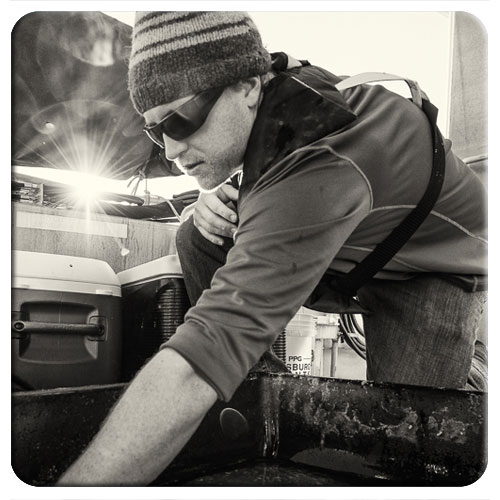
Christopher Murray started his PhD at UConn/Avery Point in September 2014, after finishing his MS in May 2014 at Stony Brook University, NY. While building on his experience in ocean acidification research, for his PhD he studyied multi-stressor effects of OA and hypoxia on coastal marine fishes. He had an outstanding, large part in designing and building ALFiRiS, our automated larval fish rearing system in UConn Rankin Seawater lab. After 4 phenomenally productive years, Chris defended his PhD in December 2018 and graduated in May 2019 with this PhD from UConn.
His thesis titled
An experimental evaluation of the sensitivity of coastal marine fishers acidification, hypoxia, and warming
is publicly available at the OpenCommons Site of the UConn Library.
After a productive post-doc on the west coast with the University of Washington (2019-2021), Chris wrote a successful NSF postdoctoral fellowship proposal and is thus currently working with Neel Aluru (Aluru Lab) at Woods Hole Oceanographic Institution, taking Atlantic silverside research to new levels. And he recently became a co-PI on our new sand lance grant, thereby ensuring further scientific productivity together.
Chris can be reached at christopher.murray@whoi.edu
Publications of Chris from his time at UConn:
- Murray, C.S. and Baumann, H. (2020) Are long-term growth responses to elevated pCO2 sex-specific in fish? PLOS One 15:e0235817
- Cross, E.L., Murray, C.S., and Baumann, H. (2019) Diel and tidal pCO2 × O2 fluctuations provide physiological refuge to a coastal forage fish. Scientific Reports 9:18146
- Murray, C.S., Wiley, D., and Baumann, H. (2019) High sensitivity of a keystone forage fish to elevated CO2 and temperature. Conservation Physiology 7:1-12
- Murray, C.S. and Baumann, H. (2018) You better repeat it: complex temperature × CO2 effects in Atlantic silverside offspring revealed by serial experimentation Diversity 10:69
- Murray, C.S., Fuiman, L., and Baumann, H. (2017) Consequences of elevated CO2 exposure across multiple life stages in a coastal forage fish
ICES Journal of Marine Science 74:1051-1061 - Baumann, H., Parks, E.M., and Murray, C.S. (2018) Starvation rates in larval and juvenile Atlantic silversides (Menidia menidia) are unaffected by high CO2 conditions
Marine Biology 165:75-83
[ocean acidification, hypoxia, Atlantic silverside, sand lance, transgenerational effects, climate change]
christopher.murray@whoi.edu | Chris' publications
Deanna Elliott (NSF REU student, 2019)
Deanna Elliott is a junior at Arizona State University who joined the Baumann lab in summer 2019 as our third NSF-REU student. Deanna has experimented with locusts before, but now became an expert fish rearer. For her REU-project she reared Atlantic silverside larvae under different feeding regimes to create fish of different body sizes and then analyzed them for trace levels of mercury in their tissue. She tested the hypothesis that mercury concentrations in fish can be used as a proxy for ingestion rates, which are important to trophic ecosystem models to perform better.Great job, Deanna!
[Atlantic silverside, Menidia menidia, mercury, ingestion rates]
dbellio2@asu.edu
Julie Pringle (MS student, 2016-18)
Her research shed new light on a particularly intriguing aspect of silverside life history; i.e., that this species exhibits temperature-dependent sex determination. Under laboratory conditions, colder temperatures produce more females than warmer temperatures, which should lead to females being born earlier during the season than males. However, Julie's study showed that survivors at the end of the growing season consist of more females than expected and that those females were larger NOT because they were born earlier, but because they grew significantly faster than their male conspecifics.
During her time, Julie never shied away from selflessly helping other students and the lab with tasks unrelated to her thesis, something we truly loved about her and will always be grateful for. She also became a brilliant Teaching Assistant and was a loved and active member of the graduate student community.
Julie has moved back to Martha's Vineyard, where she started her new position as Field Science Coordinator for the local Great Pond Foundation.
Julie says:"There's a really an amazing network of wildlife biologists at various organizations on the Vineyard, and I'm very excited to be working side-by-side with so many, who originally encouraged me to become a scientist. I'll be doing field work, but also data analysis and working with interns, so it will be a fun combination of different types of work."
Julie's Masters Thesis "Sex-Specific Hatch and Growth Patterns in Young-of-the-Year Atlantic Silversides (Menidia menidia, Atherinopsidae) from Mumford Cove, Connecticut" is accessible via the OpenCommons Site of the UConn Library.Julie's thesis research has recently been published in Marine Ecology Progress Series:
- Pringle, J.W. and Baumann, H. (2019) Otolith-based growth reconstructions in young-of-year Atlantic silversides (Menidia menidia) and their implications for sex-selective survivalMarine Ecology Progress Series 632:193-204
[Atlantic silverside, climate change, Mumford Cove, otolith microstructure analysis, growth, selective survival]
julie.pringle@uconn.edu
Sydney Stark (NSF REU student, 2018)
[Long Island Sound, ichthyoplankton, light trap, otolith, Atlantic silverside, Menhaden]
sks7111@uncw.edu
Jacob Snyder (MS student, 2015-17)
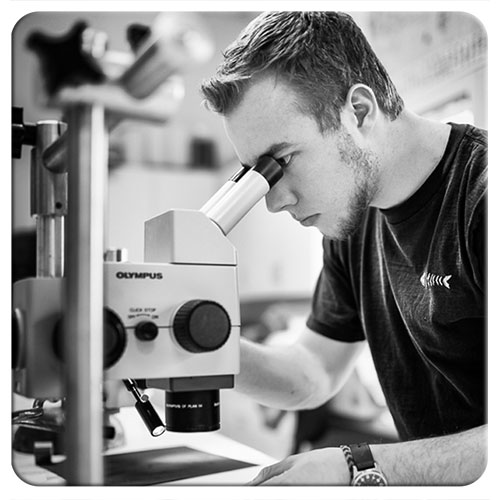
A research paper based on Jake's thesis was published in March 2019 in the peer-reviewed journal Marine Environmental Research
- Snyder, J.T., Whitney, M.M., Dam, H.G., Jacobs, M.W., and Baumann, H. (2019). Citizen science observations reveal rapid, multi-decadal ecosystem changes in eastern Long Island Sound. Marine Environmental Research 146: 80-88
During his time at the Baumann lab, Jake also conducted experiments on potential maternal effects and their influence on offspring CO2 sensitivity, published 2018 in the Journal of Experimental Marine Biology and Ecology
- Snyder, J.T., Murray, C.S., and Baumann, H. (2018) Potential for maternal effects on offspring CO2 sensitivities in the Atlantic silverside (Menidia menidia). Journal of Experimental Marine Biology and Ecology 499:1-8
[ocean acidification, hypoxia, Atlantic silverside, climate change, long-term data set, Long Island Sound]
jacob.snyder@uconn.edu | Jake's website
James Harrington (technician, 2017-2018)
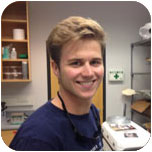
James Harrington joined the team in May 2017 to help with our various endeavors rearing fish in the Rankin Lab. He is currently maintaining population crosses of Atlantic silversides from different locations along the Atlantic Coast, which together with our colleagues from Cornell will facilitate describing and annotating the genome of this species. He is also helping with our biweekly beach seine surveys, assisting Chris with large factorial CO2 x O2 experiments on Atlantic silverside offspring, and has lent a hand to our REU student Elle with her summer work.He's is currently working as an instructor for the New England Science & Sailing Foundation (NESS) in Stonington, CT
[Atlantic silverside, genome, Mumford Cove, RNA, growth]
james.harrington@uconn.edu
Elle Parks (NSF REU student, 2017)
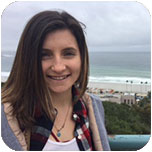
Elle Parks joined our lab from June to August 2017 as the first REU (Research Experience for Undergraduates) student on a recently funded NSF REU project in collaboration with Mystic Aquarium. She is a Junior at the University of Connecticut in Storrs and interested in aspects of marine conservation and effects of climate change. Her project looked at the presumed metabolic costs of high CO2 environments on fish larvae. Elle co-authored a manuscript that resulted from her work
- Baumann, H., Parks, E.M., and Murray, C.S.* (2018) Starvation rates in larval and juvenile Atlantic silversides (Menidia menidia) are unaffected by high CO2 conditions. Marine Biology 165:75-83
[Atlantic silverside, ocean acidification, starvation, costs]
elle.parks@uconn.edu
